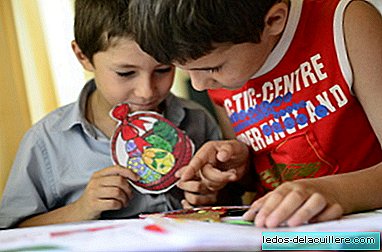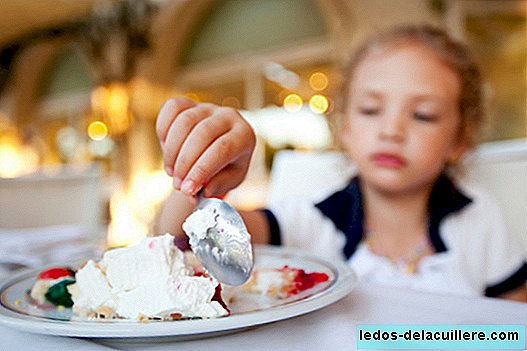
Spain is one of the countries most affected by child malnutrition. UNICEF estimated in 2012 that 2,200,000 children under 16 lived below the poverty line, 2,306.00 in 2013. Of that 27% of the child population in Spain we went to 31.9% in 2014. It is therefore not a favorable situation. According to this World Nutrition Report, on the flip side we find 42 million overweight children. According to the 2013 Aladdin Study, published by the Ministry of Health, the 24.6% of children between 7 and 8 years suffer from childhood obesity.
Food is the great pending issue. And not only for economic reasons. Poor feeding among children under 5 to 10 years is more common than we would like. In Catalonia alone, in 2011 there were 50,000 children under 16, 4% of the total, who received a poor diet and without the diversity of nutrients necessary for proper development.

Feeding the future with the present
Luckily there are social initiatives, such as SOS Children's Villages, which provide opportunities with 20 centers in Spain and many others throughout the world. To this we must add the 293 scholarships for school canteens approved in the last course and the services of confederations such as Caritas.
These initiatives include the social work of El Caserío, which has turned and associated with SOS Children's Villages, to bring food to thousands of children with poor or unhealthy diets. El Caserío is a company known to all, with 85 years of experience, and is perhaps one of the brands most associated with children: who has not tried their cheeses?
Under the motto "Feed your future", El Caserío has recently announced that it will carry out a donation of 100,000 euros to SOS Children's Villages to help in the construction of a day center for minors. The president of said NGO, Pedro Puig, signed the agreement signed on April 14, which declared "in these cases we offer support to all members, who are going through complicated and difficult situations, because we believe that the best thing for the child is live with your own family. "
This center will welcome children and young people between 6 and 18 years, striving to receive up to 100 children daily school support, trying to prevent failure and absenteeism, enabling a computer room, encouraging reading, or scheduling excursions and cultural outings. And this program also extends to families. In fact, it is intended to work with affected families to improve their coexistence, care for minors, prevent the breakdown of the family nucleus and, in short, overcome the situation.

This initiative is not simply here: in the new packs of The Farmhouse You will see information about this project and the purchase of the product you will be helping in this action. As we said, Day Centers are a step forward in supporting children and youth.
In addition, this training is designed beyond simple feeding: hygiene, preventive health and emotional education; From the center knowledge will be imparted around social and emotional training, adding leisure activities, outdoor sports and school for parents, a key element in this equation. Because we are what we eat, but also what we feel.
What happens in our brain when it is not fed correctly
The consequences of poor diet can condition the future of an entire generation: diabetes, coronary problems, growth, even in learning. Good development is a key engine for progress, the key that determines who we will be in the future. As Francisco Grande Covián, founding doctor and first president of the Spanish Society of Nutrition in 'Child Feeding', Manuel Hernández Rodríguez's book pointed out: "food plays a fundamental role in the treatment of numerous common diseases in children's age."

Poor food is usually the global thermometer of a country
As the Rome Declaration on Nutrition pointed out, coined by members of the Food and Agriculture Organization of the United Nations (FAO) and the World Health Organization (WHO), poor feeding is usually the global thermometer, the summary of economic and social crises, low agricultural productivity or military conflicts. In addition, malnutrition is more harmful in earlier stages of life.
As some specialists point out, when a brain does not receive the nutrients it needs, some regions of the brain begin to atrophy; prolonged inadequate feeding during the critical period of brain growth - from 2 to 3 years, culminating around 5 years - can cause atrophies in neuronal development, deficiencies in visual and learning development, attention problems, hyperactivity, motor difficulties and, later, failures in higher mental processes, such as abstract reasoning, synthesis and analysis.

Already noted in this interview the pediatrician and endocrine Cristina Azcona, "it has been related in different jobs the low grades in school with which the child does not eat breakfast properly. The brain needs glucose to perform, hence the need for carbohydrates. If the child suffers hypoglycemia, the brain can end up being damaged. "
Low school grades have been related to the child not having breakfast properly
And that is what we do not see with the naked eye. According to FAO reports, "it is estimated that in 2013 there were 161 million children under 5 years affected by stunted growth -Short stature for age- and 51 million for emaciation -Low weight for height-. More than 2,000 million people are affected by micronutrient deficiencies, due to insufficient vitamins or minerals. "
What kind of society do we want to build?
It is obvious that the future is not only the responsibility of the parents. It is an educational process, from textbooks to daily habit at home. Government powers must ensure stability and social pathways for a more prosperous state, ensuring future generations better fed. And food is education. The countries with the highest unemployment rates and the largest economic gaps are also those that face the greatest problems in advancing their children.

This gap not only puts the present at risk, but also the future, it also promotes inequalities that lead to discontent, class clashes and instability. If, from the same period of breastfeeding, a commitment and improvements in nutrition are sought for both the mother and the family nucleus, we can approach a more stable society.
Healthy eating - and not simply eating - is directly related to our progress as human beings. And the world grows nonstop. Hence, joining forces, getting involved and collaborating is the only valid way to reverse this global situation. The generations to come will thank you.












